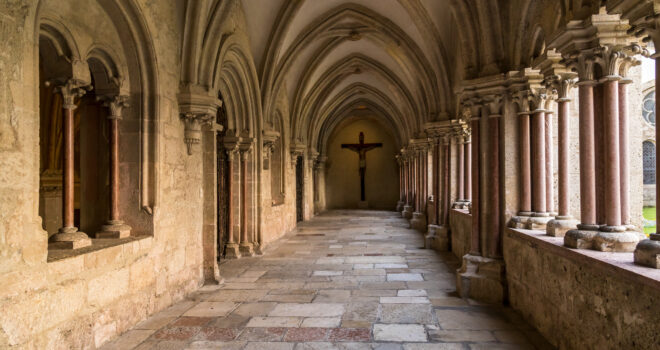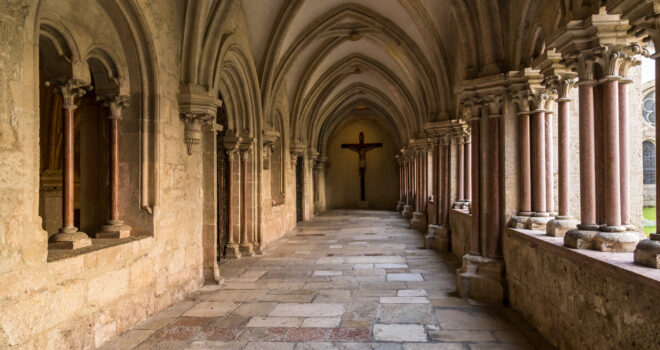How serious do you take your Sabbath rest? Perhaps the most curious condemnations found among those from the prophet Isaiah is God’s censure of Israel for failing to honor the Sabbath. “Lo, on your fast day you carry out your own pursuits, and drive all your laborers,” the Church reads on the Friday after Ash Wednesday, amid censures of God’s people for lying and murdering, fighting and taking advantage of one another.
Idol worship, child sacrifice, sexual immorality, exploiting the poor: for those misdeeds, it’s easy to appreciate God’s anger. But working on Sunday? How does that provoke such strong censure? The Divine Project: Reflections on Creation and the Church, by the late Pope Benedict XVI, helps us understand why dishonoring the Sabbath is such an egregious sin.
Reflecting on the connection between creation and the much later exile of Israel from its promised land, Benedict cites 2 Chronicles 36:21 “The land had enjoyed its sabbaths. All the days that it lay desolate it kept sabbath, to fulfill seventy years.” If you know anything about the length of the Babylonian Captivity, you’ll notice the allusion there: Israel suffered in exile for seventy years. God thus levies justice upon His people: Israel failed to maintain the Sabbath, and thus their promised land needed to be left fallow to make up for their disobedience.
Why is resting on the Sabbath so important? Obviously it was important enough that during creation, God Himself “rested” on the seventh day. And some studies have seemed to suggest that there may be some physical, emotional, and mental benefits to resting one day of the week.
Yet Benedict XVI sees something else, something even more fundamental at work than just a divinely-ordained recipe for healthy living. He observes:
Man saw his actions, his doings, his work, his self-possession, his self-realization, his belongings, as more important than the need for which creation existed, this goal of entering into freedom together, this fraternal coexistence within creation. He had refused God’s rest, his gift of leisure, the worship of him and the peace and freedom associated with it.
In other words, the Sabbath is God’s way of reminding us of what is most important: communion with the divine. It’s not just about rest, but worship. We are called to unite ourselves to God, and the Sabbath directs us, every week, to that eternal reality.
But Israel rejected the divine edict to keep the Sabbath. And often, so do we. Sure, we faithful Catholics go to Mass, perhaps do some additional prayer or spiritual reading, and (hopefully) carve out time to enjoy fellowship with family and friends. But perhaps we also try to get some things done around the house, run some errands, and, when we’re on a tight deadline, even do a little work. As Americans, this thinking is bred into us from our youth: get ahead!
Yet as tempting as that thinking may be, Benedict tells us that downplaying, if not completely circumventing the Sabbath, represents a repudiation of God and “the divine project.” He explains:
And so, because he wanted to be the sole agent in his life, acting alone and of his own accord, owing everything to his own freedom, he became ensnared in the tangled web of his own activity and his own control, falling into the bondage of action and dragging the world along with him.
The further we distance ourselves from Sabbath observance, the more we are inclined to think we are independent and sovereign over our lives. God is not in control, we are, and we can do whatever we like with our time, our bodies, and even creation itself. As Nirvana’s Kurt Cobain memorably sang, “Sunday mornin’ is every day for all I care, and I’m not scared.”
But the more we seek to wrest our Sundays from God for the sake of autonomy, the more we are enslaved to the drudgery of the hamster wheel. America is indeed a strange place, where an increasing number of its indigent citizens rely on the government to subsidize their lives, while another increasing number of Americans work multiple jobs to make ends meet. For both groups, church attendance (and, by extension, Sabbath observance) is at historic lows.
God wants to rescue us from our self-imposed slavery to labor, to getting ahead, to making that extra buck. “Operi dei nihil praeponatur” (“Let nothing be preferred to the service of God”), said St. Benedict. In reserving Sundays for true rest and true worship, we not only obey our Lord, but sanctify our lives and prepare ourselves for eternity.
In the same chapter of Isaiah, we read:
If you turn back your foot from the sabbath,
from doing your pleasure on my holy day,and call the sabbath a delight
and the holy day of the Lord honorable;if you honor it, not going your own ways,
or seeking your own pleasure, or talking idly;then you shall take delight in the Lord,
and I will make you ride upon the heights of the earth;I will feed you with the heritage of Jacob your father,
for the mouth of the Lord has spoken (Isaiah 58:13-14).
As is so often the case with the Christian life, by obeying God and directing our hearts to the eternal, Christ also takes care of our immediate needs as well. Far from arresting our progress in the rat race of life, honoring the Sabbath communicates our trust that God is powerful enough to provide for us in our weakness. Imagine how much more Israel, surrounded and outnumbered by belligerent, well-armed pagan enemies, had to trust in God’s providential care!
This Lent, we should prayerfully consider how we may have compromised our Sabbath rest. Far from a laborious task, honoring the Sabbath is freeing. Benedict says it best: “The priority of worship as the true end of creation, and therein man’s freedom, and only within this order can human beings truly function as human beings.”
✠
Photo by Michael Warwick on Shutterstock












